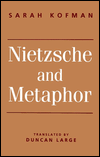

 |

|

The average rating for Nietzsche and Metaphor based on 2 reviews is 5 stars.
Review # 1 was written on 2019-11-01 00:00:00 John Wilcut John Wilcuti have just profited immensely from a rereading of kofman's short but incredibly rich text. i think the most striking (and useful) merit of kofman's work is its attentiveness to the strategic, deconstructive deployments of metaphor in early nietzsche, and in turn the shifted non-strategic status of metaphor in later nietzsche with his explicit introduction of the will to power hypothesis and the related nietzschean understandings of interpretation and text. in terms of the immense pleasure of kofman's regrettably brief work, i also particularly enjoyed her discussions of architectural metaphors in nietzsche and nietzsche's artistic and rhetorical understandings of unconscious activity. overall, i would say kofman's work is a distinctive and indeed invaluable contribution to nietzsche scholarship. while of course those interested in nietzsche should read and engage with the works on him by seminal french 'post-structralists' (to somewhat reluctantly use the label) such as foucault, derrida and deleuze, nietzsche and metaphor by their contemporary kofman should also not be overlooked. i personally prefer kofman's work to deleuze's nietzsche and philosophy and derrida's spurs: nietzsche's styles. |
Review # 2 was written on 2014-09-15 00:00:00 Myles Bowie Myles BowieSARAH KOFMAN's "Nietzsche & Metaphor" "Just as he multiplies perspectives, so Nietzsche intentionally diversifies his styles in order to save the reader from misunderstanding a single style as a 'style in itself'. [...] Its is as vain to seek to impose a canonical model on writing as it is futile to seek to legislate universally in morality. [...] Tyranny is reprehensible in all its forms, including that of any philosopher seeking to raise his spontaneous evaluation to the status of an absolute value and his style to that of a philosophical style 'in itself'. [...] The game of writing, for Nietzsche, remains subordinate to a new art of interpreting the world, the communication of a new perspective. [...] He was the first to try to translate the 'Dionysian pathos' into a 'philosophical pathos': a translation which was at the same time a transfiguration, a transposition of the 'music of the world' into the imperfect language of the word. [...] A philosophy which, by combining all the 'genres' in its writing, deletes all oppositions with one great burst of laughter." (p. 3-5) * * * * "It is only the full panoply of the art, in their hierarchized diversity subordinated to music, that symbolizes Dionysus: this god who is dismembered into a thousand pieces and who revives every year, reunified. [...] All authentic art involves intoxication, and with it the loss of the 'proper', as one is transported out of oneself in a way which alone gives power to symbolize. Expressing oneself metaphorically and undergoing a metamorphosis can thus be assimilated. It is this ecstasy outside of the self which is at the origin of Greek music drama, the total art form par excellence. The author of the ancient music drama can be compared to the pentathlete, the virtuoso in five types of sport, and the drama can be symbolized by the floating drapery introduced by Aeschylus: the drama triumphs over all that remained forced and isolated in the different arts; it reconciles discipline and grace, diversity and unity, Apollo and Dionysus." (p. 12) * * * * "Philosophical language is the most unsatisfactory there is, for it petrifies the 'music of the world' into concepts." (p. 12) * * * * "Despite everything which still connects Nietzsche's first works to the tradition, their innovatinevess, as far as the status of metaphor is concerned, reveals an original conception of philosophy and of philosophical 'style'. They introduce new relations between philosophy, art, and science. Previously philosophy and science, in the desire to speak 'properly' and demonstrate without using images or similes in order to be convincing, repressed metaphor and confined it to the poetic sphere. The philosopher resorted to metaphor only for didactic reasons... Nietzsche inaugurates a type of philosophy which deliberately uses metaphors, at the risk of being confused with poetry. The opposition between philosophy and poetry derives from metaphysical thinking; it is based on the fictitious separation of the real and the imaginary, on the no less fictitious separation of the 'faculties'. [...] The philosopher does not just 'play' with metaphors: his play is of a 'formidable seriousness', for it is designed to oppose modernity's hatred for art." (p. 18-19) TO BE CONTINUED... |
CAN'T FIND WHAT YOU'RE LOOKING FOR? CLICK HERE!!!